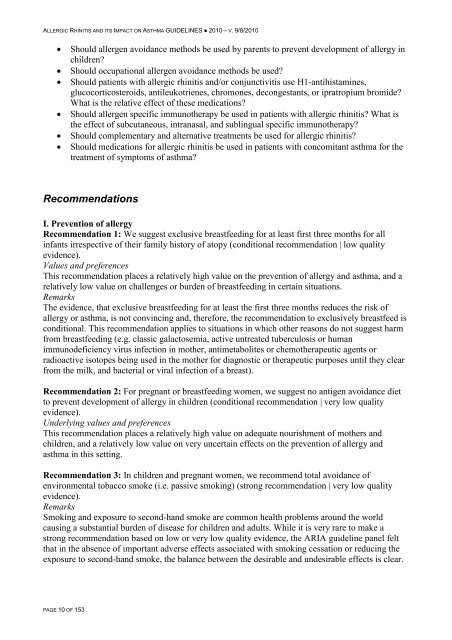Allergic Rhinitis and its Impact on Asthma - ARIA
Allergic Rhinitis and its Impact on Asthma - ARIA
Allergic Rhinitis and its Impact on Asthma - ARIA
You also want an ePaper? Increase the reach of your titles
YUMPU automatically turns print PDFs into web optimized ePapers that Google loves.
ALLERGIC RHINITIS AND ITS IMPACT ON ASTHMA GUIDELINES ● 2010 – V. 9/8/2010<br />
Should allergen avoidance methods be used by parents to prevent development of allergy in<br />
children?<br />
Should occupati<strong>on</strong>al allergen avoidance methods be used?<br />
Should patients with allergic rhinitis <str<strong>on</strong>g>and</str<strong>on</strong>g>/or c<strong>on</strong>junctivitis use H1-antihistamines,<br />
glucocorticosteroids, antileukotrienes, chrom<strong>on</strong>es, dec<strong>on</strong>gestants, or ipratropium bromide?<br />
What is the relative effect of these medicati<strong>on</strong>s?<br />
Should allergen specific immunotherapy be used in patients with allergic rhinitis? What is<br />
the effect of subcutaneous, intranasal, <str<strong>on</strong>g>and</str<strong>on</strong>g> sublingual specific immunotherapy?<br />
Should complementary <str<strong>on</strong>g>and</str<strong>on</strong>g> alternative treatments be used for allergic rhinitis?<br />
Should medicati<strong>on</strong>s for allergic rhinitis be used in patients with c<strong>on</strong>comitant asthma for the<br />
treatment of symptoms of asthma?<br />
Recommendati<strong>on</strong>s<br />
I. Preventi<strong>on</strong> of allergy<br />
Recommendati<strong>on</strong> 1: We suggest exclusive breastfeeding for at least first three m<strong>on</strong>ths for all<br />
infants irrespective of their family history of atopy (c<strong>on</strong>diti<strong>on</strong>al recommendati<strong>on</strong> | low quality<br />
evidence).<br />
Values <str<strong>on</strong>g>and</str<strong>on</strong>g> preferences<br />
This recommendati<strong>on</strong> places a relatively high value <strong>on</strong> the preventi<strong>on</strong> of allergy <str<strong>on</strong>g>and</str<strong>on</strong>g> asthma, <str<strong>on</strong>g>and</str<strong>on</strong>g> a<br />
relatively low value <strong>on</strong> challenges or burden of breastfeeding in certain situati<strong>on</strong>s.<br />
Remarks<br />
The evidence, that exclusive breastfeeding for at least the first three m<strong>on</strong>ths reduces the risk of<br />
allergy or asthma, is not c<strong>on</strong>vincing <str<strong>on</strong>g>and</str<strong>on</strong>g>, therefore, the recommendati<strong>on</strong> to exclusively breastfeed is<br />
c<strong>on</strong>diti<strong>on</strong>al. This recommendati<strong>on</strong> applies to situati<strong>on</strong>s in which other reas<strong>on</strong>s do not suggest harm<br />
from breastfeeding (e.g. classic galactosemia, active untreated tuberculosis or human<br />
immunodeficiency virus infecti<strong>on</strong> in mother, antimetabolites or chemotherapeutic agents or<br />
radioactive isotopes being used in the mother for diagnostic or therapeutic purposes until they clear<br />
from the milk, <str<strong>on</strong>g>and</str<strong>on</strong>g> bacterial or viral infecti<strong>on</strong> of a breast).<br />
Recommendati<strong>on</strong> 2: For pregnant or breastfeeding women, we suggest no antigen avoidance diet<br />
to prevent development of allergy in children (c<strong>on</strong>diti<strong>on</strong>al recommendati<strong>on</strong> | very low quality<br />
evidence).<br />
Underlying values <str<strong>on</strong>g>and</str<strong>on</strong>g> preferences<br />
This recommendati<strong>on</strong> places a relatively high value <strong>on</strong> adequate nourishment of mothers <str<strong>on</strong>g>and</str<strong>on</strong>g><br />
children, <str<strong>on</strong>g>and</str<strong>on</strong>g> a relatively low value <strong>on</strong> very uncertain effects <strong>on</strong> the preventi<strong>on</strong> of allergy <str<strong>on</strong>g>and</str<strong>on</strong>g><br />
asthma in this setting.<br />
Recommendati<strong>on</strong> 3: In children <str<strong>on</strong>g>and</str<strong>on</strong>g> pregnant women, we recommend total avoidance of<br />
envir<strong>on</strong>mental tobacco smoke (i.e. passive smoking) (str<strong>on</strong>g recommendati<strong>on</strong> | very low quality<br />
evidence).<br />
Remarks<br />
Smoking <str<strong>on</strong>g>and</str<strong>on</strong>g> exposure to sec<strong>on</strong>d-h<str<strong>on</strong>g>and</str<strong>on</strong>g> smoke are comm<strong>on</strong> health problems around the world<br />
causing a substantial burden of disease for children <str<strong>on</strong>g>and</str<strong>on</strong>g> adults. While it is very rare to make a<br />
str<strong>on</strong>g recommendati<strong>on</strong> based <strong>on</strong> low or very low quality evidence, the <strong>ARIA</strong> guideline panel felt<br />
that in the absence of important adverse effects associated with smoking cessati<strong>on</strong> or reducing the<br />
exposure to sec<strong>on</strong>d-h<str<strong>on</strong>g>and</str<strong>on</strong>g> smoke, the balance between the desirable <str<strong>on</strong>g>and</str<strong>on</strong>g> undesirable effects is clear.<br />
PAGE 10 OF 153


